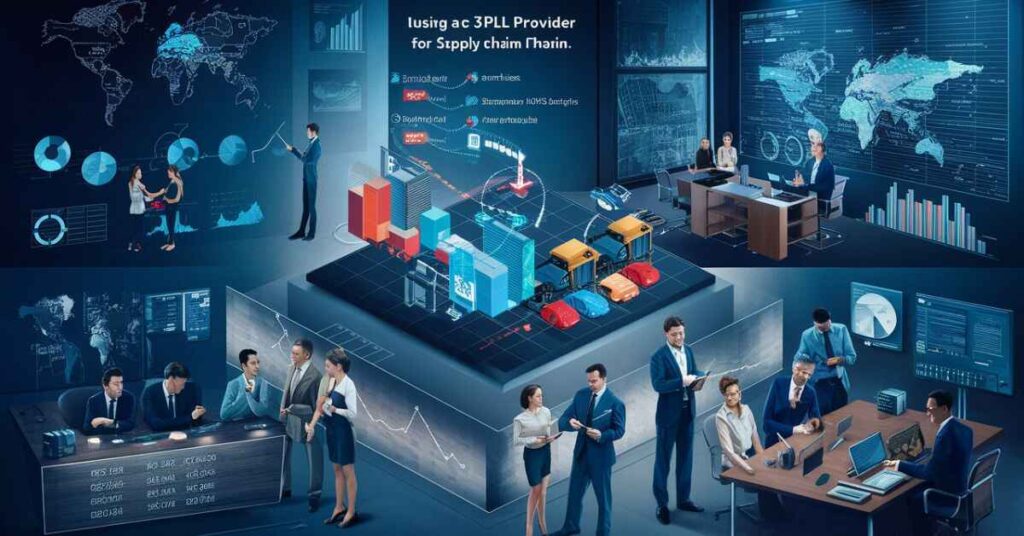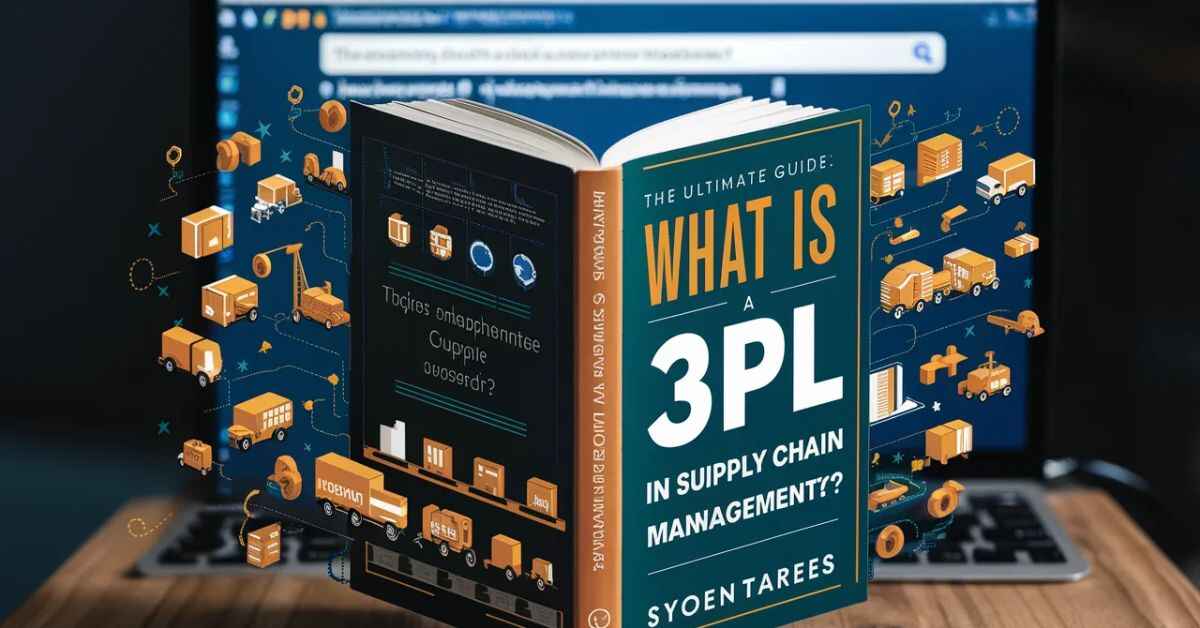In today’s fast-paced, globalized business world, efficient supply chain management is paramount. Companies are repeatedly seeking ways to streamline operations, reduce costs, and deliver products to customers quickly and reliably. Enter third-party logistics (3PL) providers – the unsung heroes of the supply chain ecosystem.
Imagine this: You’re a small e-commerce business, selling artisanal crafts to customers across the United States. Your product line is expanding, and orders are pouring in, but you’re struggling to keep up with packaging, shipping, and managing inventory across multiple warehouses. This is where a 3PL partner can be a game-changer, allowing you to outsource complex logistics operations and focus on your core proficiencies.
Understanding 3PL Providers – Third-Party Logistics Explained
A 3PL (third-party logistics) provider is a corporation that specializes in managing and executing various aspects of a business’s supply chain operations. Essentially, they act as an intermediary and control logistics functions that a company may choose to outsource rather than manage internally.
Some key services typically offered by 3PL companies include:
- Transportation: Arranging and coordinating the movement of goods via different modes (trucking, rail, air, ocean freight, etc.)
- Warehousing: Providing storage facilities and managing inventory
- Distribution: Picking, packing, and shipping orders to customers or retail locations
- Value-added services: Light assembly, product customization, labeling, and more
Think of a 3PL as an extension of your business, taking on the complex and often costly process involved in getting your products from point A to point B (and everywhere in between).
The Evolution of Third-Party Logistics Companies
While the model of outsourcing logistics activities is not new, the role of 3PL providers has evolved meaningfully over the past few decades. As globalization improved and supply chains became more difficult, businesses recognized the value of linking with specialized logistics experts.
Major shifts that drove the adoption of 3PL services include:
- Globalization: As companies expanded into international markets, managing logistics across borders became increasingly challenging.
- Cost pressures: Outsourcing logistics functions to 3PLs often provides cost savings compared to managing everything in-house.
- Technology advancements: Sophisticated supply chain management software and real-time tracking capabilities made 3PLs more efficient and attractive.
Key Services Provided by 3PL Companies in the Supply Chain
Third-party logistics provider offers a wide range of services to support businesses’ supply chain needs. Here are some of the core functions typically handled by 3PLs:

- Transportation management: Coordinating and executing the movement of goods via various modes of transportation (trucking, rail, air, ocean freight, etc.). This includes track planning, carrier selection, and freight consolidation.
- Warehousing and distribution: Operating storage facilities and managing inventory levels, as well as picking, packing, and shipping orders to customers or retail locations.
- Freight forwarding: Arranging and managing the international shipping of goods, including customs clearance and documentation.
- Cross-docking: Transferring products from incoming trucks directly onto outbound trucks, minimizing the need for storage and streamlining the distribution process.
- Reverse logistics: Handling the return and disposal of products, including repairs, refurbishing, and recycling.
Let’s take a closer look at two key 3PL services:
- Transportation Management Efficient transportation is critical in supply chain management, and 3PLs excel in coordinating the complex logistics involved. They leverage their network of carriers and optimize routes to ensure timely and cost-effective delivery. Here’s an example of how a 3PL might handle transportation for a retail company:
| 1 | Receive order details and delivery requirements from the client |
| 2 | Analyze transportation options (trucking, rail, air, etc.) based on factors like delivery timelines, costs, and product characteristics |
| 3 | Select the most suitable carrier(s) and negotiate rates |
| 4 | Consolidate shipments to maximize efficiency and reduce costs |
| 5 | Track shipments in real time and provide updates to the client |
| 6 | Handle any issues or exceptions that may arise during transit |
- Warehousing and Distribution For many businesses, managing inventory storage and order satisfaction can be a logistical nightmare. 3PLs offer robust warehousing and distribution services to streamline these processes. Here’s a typical workflow for a 3PL handling warehousing and distribution:
- Receiving: Accepting and inspecting incoming inventory from suppliers or constructors.
- Storage: Securely storing products in the appropriate warehouse facilities.
- Inventory management: Tracking stock levels and replenishing as needed.
- Order processing: Receiving customer orders and coordinating order fulfillment.
- Picking and packing: Retrieving products from storage, packaging them for shipment, and preparing shipping labels.
- Shipping: Coordinating transportation with carriers to deliver orders to customers.
Specialized 3PL Services
In addition to these core services, many 3PL providers offer particular solutions tailored to specific industries or supply chain needs. For example:
- Retail logistics: Managing the complex distribution networks required for retail operations, including store replenishment and reverse logistics.
- E-commerce fulfillment: Handling the unique challenges of direct-to-consumer order fulfillment, including fast shipping, returns processing, and Omni channel integration.
- Cold chain logistics: Managing temperature-controlled transportation and storage for perishable goods like pharmaceuticals and food products.
- Customs brokerage: Facilitating international trade by handling customs clearance, documentation, and regulatory compliance.
By offering specialized services, 3PLs can provide businesses with industry-specific expertise and tailored solutions to meet their unique supply chain requirements.
Benefits of Using a 3PL Provider for Supply Chain Management
Partnering with a reputable third-party logistics provider can offer numerous benefits for businesses of all sizes. Here are some of the key advantages:

- Cost savings: By leveraging economies of scale and optimizing logistics processes, 3PLs can often provide services at a lower cost than managing everything in-house.
- Increased efficiency and speed: 3PLs specialize in logistics operations, allowing them to streamline processes and deliver goods more quickly and reliably.
- Access to expertise and specialization: 3PLs employ teams of logistics experts with in-depth knowledge and industry-specific experience.
- Flexibility to scale: As business needs fluctuate, 3PLs can easily scale their services up or down, providing flexibility that would be challenging to achieve internally.
- Focus on core business: By outsourcing logistics functions, and industries can redirect resources and attention to their core competencies and strategic initiatives.
- Technology and infrastructure: 3PLs invest in state-of-the-art technology, infrastructure, and equipment to support logistics operations, which can be costly for individual businesses to maintain.
- Global reach: Many 3PLs have established networks and partnerships that allows them to provide seamless logistics services across international borders.
To quantify the potential impact, consider these statistics:
- Supply chain cost savings: Companies can reduce overall logistics costs by 15-30% by partnering with a 3PL provider (Source: Logistics Management).
- Inventory reduction: Effective inventory management by 3PLs can help businesses reduce inventory levels by 10-30% (Source: Supply Chain Quarterly).
- Customer satisfaction: Outsourcing logistics to a 3PL can improve on-time delivery rates by up to 25%, leading to better customer satisfaction (Source: Inbound Logistics).
Choosing the Right Third-Party Logistics Partner
While the potential benefits of partnering with a 3PL are clear, selecting the right provider is crucial to ensuring a successful partnership. Here are some key factors to consider:
- Size and capabilities: Evaluate the 3PL’s size, resources, and service offerings to ensure they align with your business needs. A smaller 3PL may be suitable for simpler operations.
- Industry experience: Consider a 3PL provider with specific experience and expertise in your industry sector. They’ll have a deeper understanding of your unique challenges and requirements.
- Technology and systems: Assess the 3PL’s technology capabilities, including their transportation management systems (TMS), warehouse management systems (WMS), and integration with your existing platforms.
- Service quality and performance metrics: Evaluate the 3PL’s track record in terms of on-time delivery, order accuracy, and overall service quality. Request performance metrics and references from existing clients.
- Geographical coverage: Ensure the 3PL has a strong presence and network in the regions where you require logistics services, whether domestic or international.
- Cultural fit: While often overlooked, cultural compatibility between your business and the 3PL provider can significantly impact the success of the partnership. Look for a provider that aligns with your company’s values and communication style.
- Pricing and contract terms: Thoroughly review and negotiate pricing structures, service level agreements (SLAs), and contract terms to ensure transparency and alignment with your business objectives.
To streamline the appraisal process, create a detailed request for suggestion (RFP) outlining your specific requests and solicit bids from multiple 3PL earners. This will allow you to compare their capabilities, pricing, and overall fit systematically.
Vetting and Selection Tips
Once you’ve identified potential 3PL partners, it’s essential to conduct thorough due diligence before making a final selection. Here are some tips:
- Site visits: Schedule visits to the 3PL’s facilities to assess their operations, infrastructure, and workforce firsthand.
- Reference checks: Speak with existing clients to gather insights into the 3PL’s performance, responsiveness, and overall partnership experience.
- Financial stability: Evaluate the 3PL’s financial health and stability to ensure they have the resources to support your business over the long term.
- Compliance and certifications: Verify that the 3PL adheres to relevant industry regulations and certifications (e.g., ISO, C-TPAT, OSHA, etc.).
- Continuous improvement: Inquire about the 3PL’s commitment to continuous improvement, including investments in technology, process optimization, and employee training.
Choosing the right 3PL partner is a critical decision that can significantly impact your supply chain operations and overall business success. Take the time to thoroughly evaluate potential providers and select the one that best aligns with your particular needs and goals.
Examples of Major 3PL Companies in the United States

The United States is home-based to numerous reputable third-party logistics providers, extending from global giants to specialized regional players. Here’s a brief overview of a few major US-based 3PL companies:
- C.H. Robinson Worldwide, Inc.
- Headquarters: Eden Prairie, Minnesota
- Services: Transportation management, freight consolidation, warehousing, consulting
- Notable strengths: Global network, technology solutions, broad service offerings
- XPO Logistics, Inc.
- Headquarters: Greenwich, Connecticut
- Services: Transportation, warehousing, distribution, freight forwarding, last-mile delivery
- Notable strengths: E-commerce and Omni channel logistics, proprietary technology
- DHL Supply Chain
- Headquarters: Westerville, Ohio (Americas Headquarters)
- Services: Transportation, warehousing, distribution, value-added services
- Notable strengths: Global reach, specialized industry solutions (e.g., healthcare, retail)
- Ryder System, Inc.
- Headquarters: Miami, Florida
- Services: Transportation management, warehousing, distribution, dedicated fleets
- Notable strengths: End-to-end supply chain solutions, private fleet management
- Expeditors International of Washington, Inc.
- Headquarters: Seattle, Washington
- Services: Freight forwarding, customs brokerage, warehousing, distribution
- Notable strengths: Global logistics network, expertise in international trade
These are just a few examples, and the right 3PL partner for your business will depend on your specific needs, industry, and geographical requirements. It’s always worthwhile to conduct thorough research and due persistence before selecting a provider.
Conclusion
Effective supply chain management is crucial for success in today’s fast-paced and global business environment. Third-party logistics (3PL) providers have emerged as invaluable partners, offering specialized expertise and services to streamline logistics operations.
By understanding what a 3PL is, its services, and the potential benefits it offer, businesses can make informed decisions about whether partnering with a 3PL provider is the right choice for their supply chain needs.
From transportation management and warehousing to specialized solutions like e-commerce fulfillment and cold chain logistics, 3PLs can help businesses reduce costs, increase efficiency, access industry expertise, and ultimately focus on their core competencies.
However, selecting the right 3PL partner is crucial. Estimate features such as size, capabilities, industry experience, technology, service quality, and cultural fit to find a provider that aligns with your specific requests.


![Find a Section 8 houses for rent with no deposit Revealed! [2024]](https://busslirra.com/wp-content/uploads/2024/08/Find-a-Section-8-houses-for-rent-with-no-deposit-Revealed-2024-300x157.jpg)







![Find a Section 8 houses for rent with no deposit Revealed! [2024]](https://busslirra.com/wp-content/uploads/2024/08/Find-a-Section-8-houses-for-rent-with-no-deposit-Revealed-2024-150x150.jpg)
